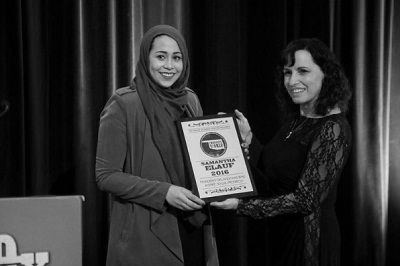
RNA - A Tulsa woman who gained national attention when she challenged a clothing retailer after she was denied a job there for wearing a headscarf was honored Sunday for her social justice advocacy.
Samantha Elauf, 26, received the Woody Guthrie Center’s second Oklahoma Changing World Prize at a ceremony held at the center in downtown Sunday night.
The award was created to celebrate people who have dedicated themselves to fighting for social justice, said Deana McCloud, executive director of the center.
Elauf applied for a job at an kids store within the Woodland Hills Mall in June 2008. At 17, she wore a black hijab in accordance with her Muslim faith to a job interview with one of the store’s assistant managers.
She was later denied that job and told that it was because her headscarf clashed with the company’s dress policy at the time, which required employees to dress in styles similar to clothing sold in the store and prohibited hats or black clothing.
Employers are required by federal law to reasonably accommodate the religious practices of their employees if they can do so without suffering undue hardship.
Elauf filed an Equal Employment Opportunity Commission complaint after being denied the job, which led the EEOC to file a lawsuit against Abercrombie & Fitch on her behalf. The lawsuit worked its way up to the U.S. Supreme Court, which ruled last year in the EEOC and Elauf’s favor in an 8-1 margin.
“I felt like I needed to stand up for what I believe in,” Elauf said. “I had never experienced anything like that and I knew it wasn’t right.”
Elauf never expected to gain the attention that she has following the situation, but said she’s happy to have a positive effect in the lives of marginalized people.
“I see how much a difference I did make, not just for myself but all minorities in the world,” she said. “Especially for Muslim women who have felt uncomfortable with the interview process or have felt like they are being judged based on their religious beliefs.”
Northern District of Oklahoma Federal District Judge Gregory Frizzell, who delivered the decision in the controversial case, commended Elauf’s actions.
“Your resolve in seeing this long and involved case through the end ... has truly advanced the development of the law on religious discrimination and employment,” Frizzell said, adding that the prize she received was “well deserved.”
847/940